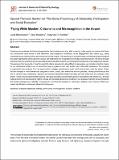Files in this item
'Flying while Muslim': citizenship and misrecognition in the airport
Item metadata
| dc.contributor.author | Blackwood, Leda Moore | |
| dc.contributor.author | Hopkins, Nick | |
| dc.contributor.author | Reicher, Stephen David | |
| dc.date.accessioned | 2015-11-18T16:40:03Z | |
| dc.date.available | 2015-11-18T16:40:03Z | |
| dc.date.issued | 2015 | |
| dc.identifier | 210800064 | |
| dc.identifier | 722e25a3-bfb7-4c62-8ad4-0fa60fb7af79 | |
| dc.identifier | 85018224026 | |
| dc.identifier.citation | Blackwood , L M , Hopkins , N & Reicher , S D 2015 , ' 'Flying while Muslim': citizenship and misrecognition in the airport ' , Journal of Social and Political Psychology , vol. 3 , no. 2 , pp. 148-170 . https://doi.org/10.5964/jspp.v3i2.375 | en |
| dc.identifier.issn | 2195-3325 | |
| dc.identifier.uri | https://hdl.handle.net/10023/7817 | |
| dc.description | This research was funded by the Scottish Institute for Policing Research and a Leverhulme Trust Early Career Fellowship. | en |
| dc.description.abstract | Contemporary analyses of citizenship emphasise the importance of being able to occupy public space in a manner that does not compromise one’s sense of self. Moreover, they foreground individuals’ active engagement with others (e.g., being concerned about others) and the active exercise of one’s rights. We explore such issues through considering the psychological and social significance of having one’s various self-definitions mis-recognised in everyday social interactions. We do so through reporting interview and focus group data obtained from Scottish Muslims concerning their experience of surveillance at airports. Focussing on their accounts of how they orient to others’ assumptions about Muslim passengers, we consider what this means for our participants’ ability to act on terms that they recognise as their own and for their citizenship behaviours. Our analysis is organised in two sections. First, we examine the strategies people use to avoid painful encounters inside the airport. These include changes in micro-behaviours designed to avert contact, and where this was not possible, identity performances that are, in various ways, inauthentic. Second, we examine citizenship-related activities and how these may be curtailed in the airport. These include activities that entail the individual reaching out and making positive connections with others (e.g., through helping others) and exercising the right to criticise and complain about one’s treatment. Our analyses highlight the psychological and social consequence of identity misrecognition, and how this impacts on individuals’ abilities to act in terms of their own valued identifications and enact citizenship behaviours. | |
| dc.format.extent | 449307 | |
| dc.language.iso | eng | |
| dc.relation.ispartof | Journal of Social and Political Psychology | en |
| dc.subject | Everyday citizenship | en |
| dc.subject | Identity | en |
| dc.subject | Surveillance | en |
| dc.subject | Misrecognition | en |
| dc.subject | Airports | en |
| dc.subject | Muslims | en |
| dc.subject | BF Psychology | en |
| dc.subject | NDAS | en |
| dc.subject.lcc | BF | en |
| dc.title | 'Flying while Muslim': citizenship and misrecognition in the airport | en |
| dc.type | Journal article | en |
| dc.contributor.institution | University of St Andrews. School of Psychology and Neuroscience | en |
| dc.contributor.institution | University of St Andrews. St Andrews Sustainability Institute | en |
| dc.identifier.doi | https://doi.org/10.5964/jspp.v3i2.375 | |
| dc.description.status | Peer reviewed | en |
| dc.identifier.url | http://jspp.psychopen.eu/public/journals/1/accepted/375-2530-1-CE_AM.pdf | en |
This item appears in the following Collection(s)
Items in the St Andrews Research Repository are protected by copyright, with all rights reserved, unless otherwise indicated.

